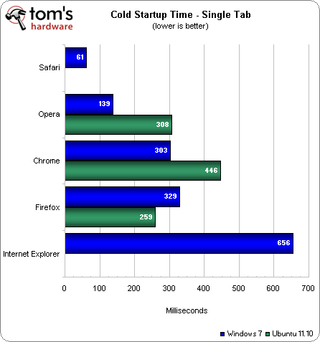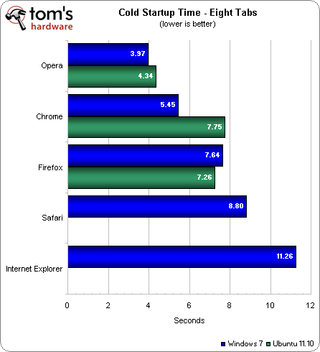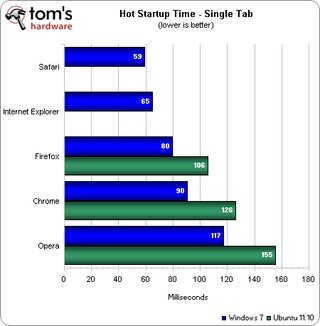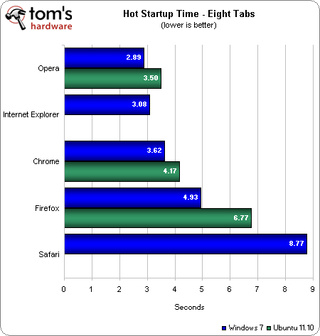Web Browser Grand Prix 9: Chrome 17, Firefox 10, And Ubuntu
Last month, we ran WBGP VIII on a MacBook Air, representing browser performance in a native Mac environment. Today we're returning to the PC. But the cross-platform comparison theme continues with a long-overdue rematch to WBGP 2: The Linux Circuit.
Startup Time Performance Benchmarks
The startup time test pages are saved to disk and hosted from our local Web server. Because this test so closely relates to the home tab(s), the test page(s) are already in cache.
We use the Google homepage as our single-tab test page. We begin timing when the execute command has been given for the browser, and stop timing when the test page finishes loading.
The homepages of Google, YouTube, Yahoo!, and the Huffington Post, as well as product pages on Amazon, Wikipedia, Craigslist, and eBay make up the eight-tab test. The eight test pages are set as the home tabs of each browser. We stop timing the eight-tab test once all tabs finish loading.
| Cold Startup Times |
Cold startup times refer to how long it takes a browser to start for the first time after booting up. This is the time you would expect to wait when first turning on your computer and opening a Web browser.
Single-Tab

Safari tops the charts, needing a mere 61 milliseconds to open a single tab. Opera places second, taking more than two times Safari's result. Chrome again doubles Opera's time to place third, followed closely by Firefox in fourth. Microsoft Internet Explorer 9 comes in last place.
Firefox 10 takes the lead in Ubuntu, with just a quarter-second to start and load one tab. Opera comes in second place, with Chrome trailing in third. Chrome and Opera's Linux times are lower than their Windows times, but Firefox for Ubuntu shaves nearly a tenth of a second off its Windows 7 time.
Stay On the Cutting Edge: Get the Tom's Hardware Newsletter
Get Tom's Hardware's best news and in-depth reviews, straight to your inbox.
Eight Tabs

Opera takes the lead on both platforms when opening eight tabs, finishing in about four seconds. Chrome wraps up our workload second in Windows, but third in Ubuntu, while Firefox takes third in Windows and second in Ubuntu. Safari places fourth at just under nine seconds, while Microsoft's own IE9 comes in last with a finishing time of more than eleven seconds.
| Hot Startup Times |
Hot startup times refer to opening a browser that has already been opened and closed. This is the duration you'd expect to wait if you closed your browser, but didn't reboot.
Single-Tab

After a hot start, Safari still reigns at just 59 milliseconds. IE9 comes in second, dropping from over a half second to just 65 milliseconds. Firefox places third at 80 ms, with Chrome closely in tow at 90 ms. Opera places last at over a tenth of a second.
In Ubuntu the order remains, with Firefox taking first place, Chrome second, and Opera third.
Eight Tabs

Opera once again shoots to the top at just under three seconds in Windows 7 and 3.5 s in Ubuntu. IE9 comes in second in Windows, followed by Chrome in third (second in Ubuntu). Firefox places fourth in Windows at just under five seconds, and last in Linux at just under seven. Safari fills the last place spot in Windows at nearly nine seconds.
Surprisingly, IE9 has the most trouble starting up cold on Windows. Firefox for Ubuntu has a leg up on its Windows version for both cold times. Apple Safari takes a substantial lead for single-tab times, while it performs poorly on the eight-tab tests. Opera continues to own both eight-tab tests, on both platforms.
Current page: Startup Time Performance Benchmarks
Prev Page WBGP9 Test Suite And Methodology Next Page Page Load Time Performance Benchmarks-
mayankleoboy1 just wondering if use of a DX11 capable GPU will change scores in some HTML5 and other benchmarks as the browsers use DX11 assisted rendering.Reply
Also, AMD driver support in linux is poor compared to Nvidia.
For future Linux articles, can you use a Dx11 based Nvidia GPU? -
mayankleoboy1 IMO, Firefox is concentrating more on HTML5, ignoring CSS and JavaScript.Reply
It does well in HTML5 benches but 99% of the websites use primarily CSS and JS and HTML3, in which Firefox does poorly.
-
mayankleoboy1 Waiting for OPERA12. It keeps impressing me.Reply
Even without hardware acceleration, it keeps up with the competition,
When that beast launches, it will kill FF/IE and most probably chrome too. -
PreferLinux Who wants to guess that the poor Linux Flash and WebGL results were because Flash and WebGL don't use hardware acceleration with that graphics card and driver? I would be thinking so.Reply -
mitch074 Firefox performance took a dive starting with version 4, where all hardware acceleration was disabled: before then, in version 3.6, XRENDER was used when available (it was 4/5th as fast as IE9 on the same PC) while it is now really slow - it's all software.Reply
Moreover, the only driver enabled for hardware acceleration on Linux is the Nvidia driver: according to Mozilla (and verified by yours truly on AMD and Intel hardware), most display drivers in Linux suck when it comes to 2D rendering - ouch. Note that Mozilla and Google could add shims to circumvent those bugs, but they don't -not worth the effort, especially when driver makers could fix their bugs rather easily, leaving the browsers broken yet again. -
indian-art I use Chrome (19.0.1041.0 dev presently) the most on Linux (Ubuntu) and empirically I felt Chrome works very well. Now your tests confirm it.Reply
I find Opera 12 really nice too. It can run with Opera 11.61. Opera 12 has a silver icon & 11.61 has its classic red. I like Firefox & Epiphany too.
Its a shame Safari and IE are not truly cross-platform. -
mayankleoboy1 how many of those top 40 sites use HTML5?Reply
i think that the HTML5 scores should be weighed by a factor of the percent of top40 sites that use HTML5.
This way actual importance of HTML5 can be judged in real world. -
nd22 It's a shame Apple does not pay enough attention to the Windows market and optimize their browser! On Mac Safari is king of the hill - personal opinion of course!Reply
On Windows I feel that IE9 works really well for me, although Chrome is the speed demon! FF 4+ lost their appeal for me. -
forestie The OSes that are used are 64 bits but the browsers are mostly (all?) 32bits on Windows, and probably 64bits on Linux.Reply
Internet Explorer has 64bits builds on Win7, and Firefox has "almost" a 64bits browser on Windows too: Waterfox, which is a semi-official Firefox for 64bits Windows. Waterfox in particular claims huge improvements over base 32bits install, I would like to see how that translates into real-world.
Not sure about availability of 64bits editions of other browsers on Windows.
Here are my wishes:
-clearly mention if the 32bits or 64bits version of the browser is used
-where applicable and relevant, test with both 32bits and 64bits variants. I would like to see IE and FF split into 32 and 64 variants on Win for example.
I personally migrated from FF to WF on my machines 3 weeks ago and find it noticeably faster in everyday use. WF is now my main browser. -
doive1231 As long as phones keep using Android, Chrome will be the most popular browser for a long while. Google have got it all sorted.Reply
Most Popular

